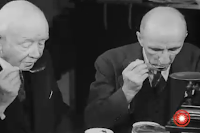
14 years ago
 I'm hunting a good French press again. Teaware doesn't last forever, and the glass beaker on my favorite large press cracked a while back. But it raises the question: Is a French press teaware?
I'm hunting a good French press again. Teaware doesn't last forever, and the glass beaker on my favorite large press cracked a while back. But it raises the question: Is a French press teaware?Imagine the smell of the freshly roasted tea at Uji
now that the renowned yamabuki are in full bloom.
— Basho

 That's how a flapper might describe me, I guess. I ran across this post from a book shop owner who happened upon a stack of old editions of Flapper magazines ("Not for Old Fogies"). The July 1922 edition included "A Flapper's Dictionary," running down the slang terms common to liberating women of the day. "The flapper movement is not a craze, but something that will stay," the author asserts. "Many of the phrases now employed by members of this order will eventually find a way into common usage and be accepted as good English."
That's how a flapper might describe me, I guess. I ran across this post from a book shop owner who happened upon a stack of old editions of Flapper magazines ("Not for Old Fogies"). The July 1922 edition included "A Flapper's Dictionary," running down the slang terms common to liberating women of the day. "The flapper movement is not a craze, but something that will stay," the author asserts. "Many of the phrases now employed by members of this order will eventually find a way into common usage and be accepted as good English." The ultimate symbol of British imperialism and capitalist extremes, with an impressive history, the East India Co. was dissolved more than a century ago. But Mumbai-born Sanjiv Mehta opened a fine-foods shop last summer in London using the famous name, to which he'd acquired the official rights and trademarks (even the coat of arms). While the new East India Co. has no plans to dominate global trade again, it is offering — how could it not? — a sizable array of teas.
The ultimate symbol of British imperialism and capitalist extremes, with an impressive history, the East India Co. was dissolved more than a century ago. But Mumbai-born Sanjiv Mehta opened a fine-foods shop last summer in London using the famous name, to which he'd acquired the official rights and trademarks (even the coat of arms). While the new East India Co. has no plans to dominate global trade again, it is offering — how could it not? — a sizable array of teas. 1942 Japanese tea ceremony at home
1942 Japanese tea ceremony at home Das Fuhrer sits down for tea
Das Fuhrer sits down for tea These are the men in charge of your tea
These are the men in charge of your tea Monkey tea, monkey brew
Monkey tea, monkey brew The amazing 163-year-old man!
The amazing 163-year-old man!Turn on the tea and let it brew
I like six cups not one or two
My nerves are shaking and my heart is breaking
It's just because of all the tea I take
Bring out the cups and honey too
Turn on the tea and let it brew
A good woman is like a tea bag. You never know how strong she is until she gets in hot water.
— Eleanor Roosevelt